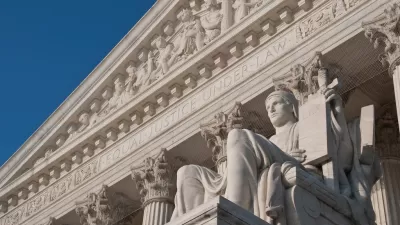In a forceful op-ed, professor John D. Echeverria argues the Supreme Court's recent "blockbuster" land use decision will "result in long-lasting harm to America’s communities." Not so fast, says Rick Hills, the decision offers an "exit strategy".

For two contrasting takes on the U.S. Supreme Court's recent decision in Koontz v. St. Johns River Water Management District, see Vermont Law School professor John D. Echeverria's blistering op-ed in The New York Times and NYU law professor Rick Hills' more measured interpretation in PrawfsBlawg.
Echeverria argues that the ruling "makes it hard for communities to get property owners to pay to mitigate any environmental damage they may cause."
"Cities and towns across America routinely attach fees and other payment obligations to permits, for example, to support wetlands mitigation banks, to finance roads, to pay for new schools or to build affordable housing," he explains. "While, to be sure, such mandates must be reasonable under the Constitution, the revolutionary and destructive step taken by the court in Koontz is to cast the burden on the government to justify the mandates according to the heightened Nollan-Dolan standard. This is contrary to the traditional court approach of according deference to elected officials and technical experts on issues of regulatory policy. Moreover, this heightened standard will result in a huge number of costly legal challenges to local regulations."
Hills, on the other hand, says the ruling shows a court unwilling, or unable, to "duplicate the work of state courts in policing conditions on literally hundreds of thousands of land-use permits..."
"Thankfully," he continues, "Koontz carefully preserves a convenient albeit disingenuous 'remedial' exit strategy that should insure that the decision is a dead letter."
FULL STORY: A Legal Blow to Sustainable Development

Planetizen Federal Action Tracker
A weekly monitor of how Trump’s orders and actions are impacting planners and planning in America.

Maui's Vacation Rental Debate Turns Ugly
Verbal attacks, misinformation campaigns and fistfights plague a high-stakes debate to convert thousands of vacation rentals into long-term housing.

San Francisco Suspends Traffic Calming Amidst Record Deaths
Citing “a challenging fiscal landscape,” the city will cease the program on the heels of 42 traffic deaths, including 24 pedestrians.

Defunct Pittsburgh Power Plant to Become Residential Tower
A decommissioned steam heat plant will be redeveloped into almost 100 affordable housing units.

Trump Prompts Restructuring of Transportation Research Board in “Unprecedented Overreach”
The TRB has eliminated more than half of its committees including those focused on climate, equity, and cities.

Amtrak Rolls Out New Orleans to Alabama “Mardi Gras” Train
The new service will operate morning and evening departures between Mobile and New Orleans.
Urban Design for Planners 1: Software Tools
This six-course series explores essential urban design concepts using open source software and equips planners with the tools they need to participate fully in the urban design process.
Planning for Universal Design
Learn the tools for implementing Universal Design in planning regulations.
Heyer Gruel & Associates PA
JM Goldson LLC
Custer County Colorado
City of Camden Redevelopment Agency
City of Astoria
Transportation Research & Education Center (TREC) at Portland State University
Jefferson Parish Government
Camden Redevelopment Agency
City of Claremont




























